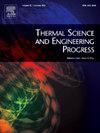Manuscript Title:Thermal-Electrical scheduling of Low-Carbon Industrial energy systems with rooftop PV: An improved Red-Billed blue magpie optimization approach
IF 5.1
3区 工程技术
Q2 ENERGY & FUELS
引用次数: 0
Abstract
To address the global warming problem and reduce carbon emissions while considering economic factors, this study proposes an improved Red-billed Blue Magpie Optimizer (IRBMO) for the optimal scheduling of an integrated energy system (IES) with rooftop photovoltaic (RPV). First, a low-carbon IES is developed by integrating renewable energy units with reward-penalty gradient carbon trading, power-to-gas conversion, and carbon capture technologies, utilizing real-world plant data to model RPV. Subsequently, IRBMO is validated by comparing its performance against the CEC 2022 benchmark test functions. Finally, IRBMO is applied to optimize IES scheduling and evaluate its effectiveness against other algorithms. Results demonstrate that IRBMO surpasses RBMO in multiple test functions, exhibiting enhanced global search capability and stability. The proposed IES achieves significant economic and environmental benefits: compared to a system without RPV, it reduces total costs by 37.7% and carbon emissions by 50.7%. In optimal scheduling, IRBMO outperforms the Genghis Khan Shark Optimizer, RBMO, and Coati Optimization Algorithm, lowering total costs by 0.15%, 0.16%, and 4.11%, respectively, and reducing emissions by 2.30%, 1.97%, and 38.47%. This confirms IRBMO’s efficacy in advancing cost-effective and low-carbon energy management.
论文题目:屋顶光伏低碳工业能源系统的热电调度:一种改进的红嘴蓝喜鹊优化方法
为了解决全球变暖问题,减少碳排放,同时考虑经济因素,提出了一种改进的红嘴蓝喜鹊优化器(IRBMO),用于屋顶光伏(RPV)集成能源系统(IES)的最优调度。首先,通过将可再生能源单元与奖惩梯度碳交易、电制气转换和碳捕获技术相结合,利用真实工厂数据建立RPV模型,开发出低碳IES。随后,通过将其性能与CEC 2022基准测试功能进行比较,对IRBMO进行了验证。最后,将IRBMO应用于IES调度优化,并与其他算法比较其有效性。结果表明,IRBMO在多个测试功能上都优于RBMO,具有更强的全局搜索能力和稳定性。拟议的IES具有显著的经济和环境效益:与没有RPV的系统相比,它降低了37.7%的总成本和50.7%的碳排放。在最优调度方面,IRBMO优于成吉思汗鲨鱼优化器、RBMO和Coati优化算法,总成本分别降低0.15%、0.16%和4.11%,排放量分别降低2.30%、1.97%和38.47%。这证实了IRBMO在推进具有成本效益和低碳能源管理方面的有效性。
本文章由计算机程序翻译,如有差异,请以英文原文为准。
求助全文
约1分钟内获得全文
求助全文
来源期刊

Thermal Science and Engineering Progress
Chemical Engineering-Fluid Flow and Transfer Processes
CiteScore
7.20
自引率
10.40%
发文量
327
审稿时长
41 days
期刊介绍:
Thermal Science and Engineering Progress (TSEP) publishes original, high-quality research articles that span activities ranging from fundamental scientific research and discussion of the more controversial thermodynamic theories, to developments in thermal engineering that are in many instances examples of the way scientists and engineers are addressing the challenges facing a growing population – smart cities and global warming – maximising thermodynamic efficiencies and minimising all heat losses. It is intended that these will be of current relevance and interest to industry, academia and other practitioners. It is evident that many specialised journals in thermal and, to some extent, in fluid disciplines tend to focus on topics that can be classified as fundamental in nature, or are ‘applied’ and near-market. Thermal Science and Engineering Progress will bridge the gap between these two areas, allowing authors to make an easy choice, should they or a journal editor feel that their papers are ‘out of scope’ when considering other journals. The range of topics covered by Thermal Science and Engineering Progress addresses the rapid rate of development being made in thermal transfer processes as they affect traditional fields, and important growth in the topical research areas of aerospace, thermal biological and medical systems, electronics and nano-technologies, renewable energy systems, food production (including agriculture), and the need to minimise man-made thermal impacts on climate change. Review articles on appropriate topics for TSEP are encouraged, although until TSEP is fully established, these will be limited in number. Before submitting such articles, please contact one of the Editors, or a member of the Editorial Advisory Board with an outline of your proposal and your expertise in the area of your review.
 求助内容:
求助内容: 应助结果提醒方式:
应助结果提醒方式:


